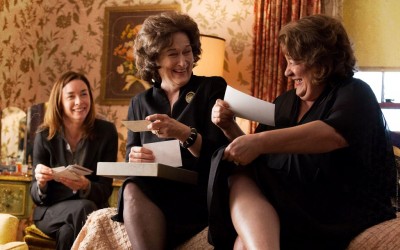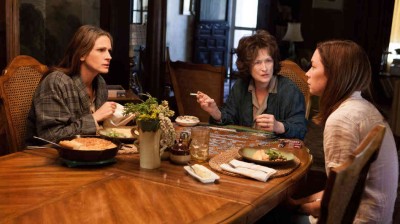
August: Osage County is good, and it’s certainly entertaining to no end as an overwrought black comedy of a theatrical nature. It’s also a scenery-chewer’s field day — maybe too much so, no matter how enjoyable all the dramatics and smashed dinnerware are. The previous films made from Tracy Letts’ plays — Bug (2006) and Killer Joe (2012) — had the advantage of a strong director at the helm in William Friedkin. Strong directors, alas, seem to be out of fashion with Meryl Streep, who is more comfortable these days with filmmakers she can control. (A director less cowed by her Streepness might have warned her that Julia Roberts was walking away with the picture.) So instead of a Friedkin, we have John Wells — the guy who tried to make us all weepy-eyed over Ben Affleck losing his Porsche in The Company Men (2010). Let us call his contributions to the film of Letts’ Pulitzer Prize-winning play workmanlike and move on to the twisted delights of the material.

In a way, the material here is not dissimilar to Killer Joe — minus the murderous and criminal elements, and with a considerably more polished (on the surface at least) and generally less stupid (but almost equally dysfunctional) family at its center. The characters here are from a decidedly upscale Oklahoma family, more or less presided over by Beverly (Sam Shepard) and Violet (Meryl Streep) Weston. When the story starts, Beverly has drifted into the role of a genially philosophical dipsomaniac. Violet is an outspoken, pill-addled cancer victim who delights in outraging anyone she can — including the Native American caretaker (Misty Upham, Frozen River) Beverly has recently hired. This, however, is merely the overture to the grand opera that starts with the disappearance and death (apparently suicide) of Beverly. It’s this that brings the entire Weston clan and their spouses, etc., back to the old homestead — and its unsparing (and slightly unhinged) matriarch. Unsurprisingly, Violet is much better at playing queen bitch than grieving widow.

It isn’t just that all these relatives — most of whom don’t want to be there — descend on one place, it’s that they all come bearing issues, secrets and problems of their own. Think of it perhaps as Who’s Afraid of Virginia Woolf on a much larger scale — with slightly soapy secrets instead of suggested depravity. Before all the laundry has been thoroughly aired, we will have found ourselves wading through various forms of adultery, dubious paternity issues, assorted tales of generations of abuse and even a touch of incest. For this lot — at least on the female side — it’s just another house party with the folks. The backbone of the clan — twisted though it may be — is very clearly maternal. The men are generally on the ineffectual side. When one of them (Chris Cooper) does take a stand on something, it’s so out of character that it’s truly shocking.

How you’ll feel about it will depend largely on your taste for very loud and extremely theatrical melodrama served up as a dark comedy by high-class performers. If that’s not your cup of oolong, then August: Osage County is not for you. This is a free-for-all for broad performances, and while I’ve criticized Streep for pitching her entire pill-fueled, viper-tongued turn to the back row of the upper balcony, I can’t say it isn’t enjoyable in its utter lack of restraint. The truth is that her histrionics serve to make Roberts’ performance look restrained. In any other film, that is not a term I’d readily use. (It’s also Roberts’ best work since 2004’s Closer.)

Make no mistake, August: Osage County is not brilliant filmmaking. For that matter, although Tracy Letts’ dialogue is excellent, I can’t say that the whole thing strikes me as particularly deep or meaningful. It’s wonderfully bitchy soap opera allowed to run wild on a large scale. In that regard, it’s satisfying and entertaining — and I’m not at all sure I think it needed to be any more than that. The Weinsteins — who were clearly baiting Oscar with it — probably feel otherwise, but that’s their problem, not ours. Rated R for language including sexual references, and for drug material,
Playing at Carmike 10..




This is one that I’ve been trepidatious to see. I’m very familiar with the stage play, it’s one that actors drool to get, it’s hard on audiences, and it can turn into a bunch of meandering yelling if the direction isn’t there. I know Tracy Letts’ himself has mentioned some concern over it being turned into a film for that very reason.
John Wells is an excellent writer – one of the best – but a director? Meh.
I don’t know the play, so I can’t compare them. I understand that about an hour of the play has been pruned — presumably by Letts, since he wrote the screenplay.
I only know Wells from The Company Men, but since he’s basically a TV writer that’s no surprise.
The New Yorker ran a story about this same problem.
http://www.newyorker.com/online/blogs/culture/2014/01/why-august-osage-county-is-better-onstage-than-onscreen.html
I have a mild aversion to the business of using the memory of a theatrical experience that cannot be tested as a barometer for a film. I have a friend who’s always going on about how the movies never captured Vanessa Redgrave’s brilliance onstage. I find this tedious and pointless, since he cannot show me that brilliance.